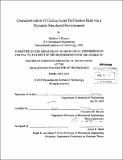Characterization of cardiac lead perforation risk via a dynamic simulated environment
Author(s)
Rosario, Matthew J
DownloadFull printable version (17.92Mb)
Other Contributors
Massachusetts Institute of Technology. Dept. of Mechanical Engineering.
Advisor
Alexander H. Slocum.
Terms of use
Metadata
Show full item recordAbstract
Delayed cardiac perforation is a serious medical condition where an implanted cardiac lead migrates through the heart wall, causing life-threatening complications. Where acute perforation occurs during implant, delayed perforation is not detected until after 30 days from implant and is frequently not diagnosed until complications are present. The phenomenon is particularly prevalent in cardiac leads with active helices. Detailed here is a test method that subjects leads to cyclic loading in an environment similar to that of the human heart. A test setup was developed; leads migrate through a degradable cardiac simulant for a fixed cycle count, after which the simulant is evaluated. Initial testing was conducted and improvements made to the device. Nineteen cardiac lead models were tested and ranked in three metrics related to perforation damage. Trends matched available medical knowledge on lead perforation risk. This experiment provides a framework for further investigation into lead perforation.
Description
Thesis (S.M.)--Massachusetts Institute of Technology, Dept. of Mechanical Engineering, 2012. Cataloged from PDF version of thesis. Includes bibliographical references (p. 102-103).
Date issued
2012Department
Massachusetts Institute of Technology. Department of Mechanical EngineeringPublisher
Massachusetts Institute of Technology
Keywords
Mechanical Engineering.